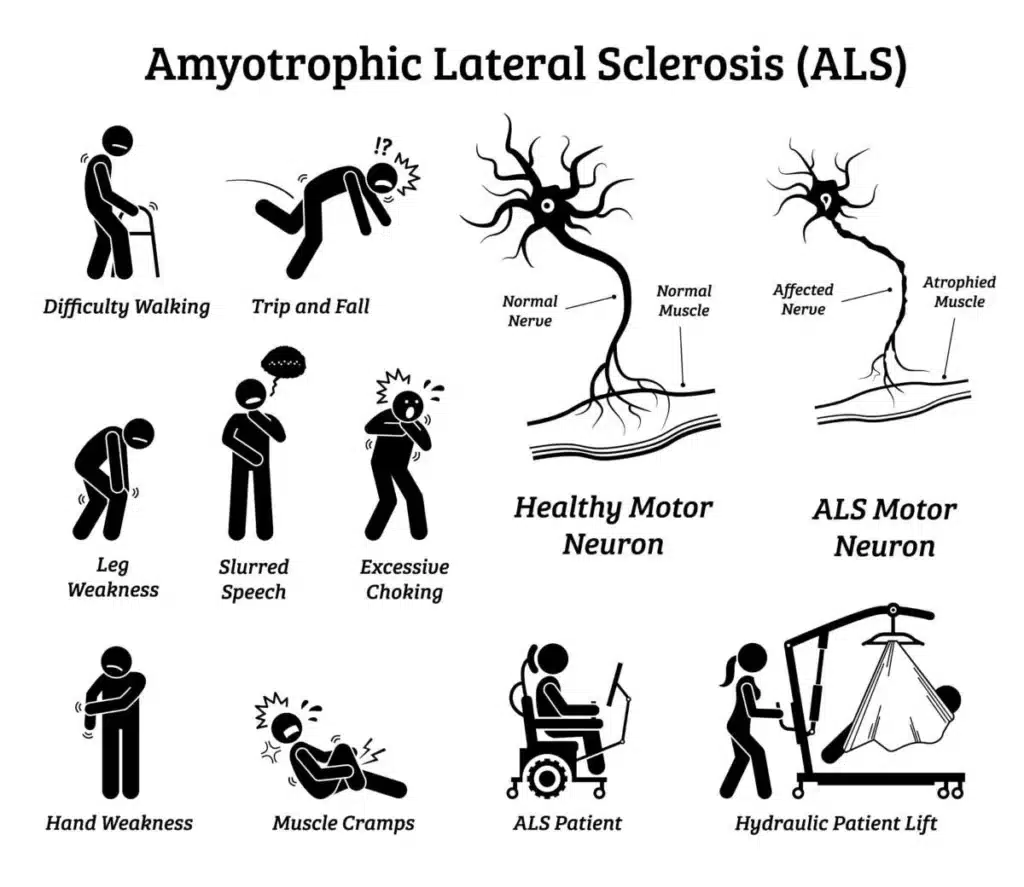Despite the severity of the disease, most people with ALS desire to—and do—remain at home. In-home care for individuals with Amyotrophic Lateral Sclerosis (ALS) is an essential aspect of managing this progressive neurodegenerative disease, as it allows patients to maintain a higher quality of life while remaining in the comfort of their own homes. ALS is characterized by the gradual loss of motor neurons, leading to muscle weakness, paralysis, and eventually, the inability to perform basic bodily functions such as speaking, eating, and breathing.

The importance of in-home care for ALS
In-home care is critical for ALS patients because it provides a personalized and familiar environment where they can receive comprehensive support tailored to their specific needs. Unlike hospital or hospice care, in-home care allows patients to stay in a place where they feel most comfortable, surrounded by their loved ones. This is particularly important for ALS patients, as the emotional and psychological impacts of the disease can be as challenging as the physical symptoms. The familiarity of home can provide a sense of normalcy and security, which is vital for the mental well-being of the patient.
Moreover, in-home care ensures that patients receive continuous, round-the-clock care without the need for frequent hospital visits or prolonged stays in medical facilities. This reduces the burden on both the patient and their family members, who might otherwise have to navigate the complexities of hospital care. In-home care also allows for more direct communication between the patient, their family, and the caregivers, ensuring that everyone is on the same page regarding the care plan and any necessary adjustments.

Key components of in-home care for ALS
In-home care for ALS involves a multidisciplinary approach, with various types of professionals working together to meet the patient’s needs. These services can be customized based on the stage of the disease, the patient’s preferences, and the resources available. Below are the key components of in-home care for ALS patients:
1. Personal care assistance
Personal care provided by a dedicated, trained professional is a fundamental aspect of in-home care for ALS patients, especially as the disease progresses and the patient loses the ability to perform activities of daily living independently. Caregivers assist with basic tasks such as bathing, dressing, grooming, toileting, and feeding. For patients who are wheelchair-bound or bedridden, caregivers help with mobility, including transferring the patient from the bed to a wheelchair and ensuring they are positioned comfortably to prevent bedsores or other complications.
In addition to these daily tasks, caregivers also play a crucial role in monitoring the patient’s overall well-being, including their emotional and psychological state. They provide companionship, which is vital for patients who may feel isolated or depressed due to their condition. The caregiver’s presence can offer comfort and reassurance, helping to alleviate some of the anxiety and fear that often accompany a diagnosis of ALS.
2. Medical and nursing care
ALS is a medically complex condition that requires careful management by trained professionals. In-home nursing care is often necessary to handle the medical needs of ALS patients, particularly as the disease advances. Registered Nurses (RNs) or Licensed Practical Nurses (LPNs/auxiliary nurses) can administer medications, manage feeding tubes, perform wound care, and monitor vital signs such as blood pressure, heart rate, and oxygen levels.
For patients who require respiratory support, in-home nurses are trained to manage devices such as BiPAP machines or ventilators. These devices are crucial for patients who have difficulty breathing due to the weakening of the respiratory muscles. Nurses also play an essential role in educating the patient and their family on how to use these devices properly, ensuring that they are comfortable and confident in managing the equipment.
Another important aspect of medical care is pain management. ALS can cause significant discomfort due to muscle cramps, stiffness, and other symptoms. In-home nurses work closely with the patient’s medical team to develop a pain management plan that may include medications, physical therapy, and other interventions to alleviate pain and improve the patient’s quality of life.
3. Respiratory support
Respiratory failure is a common complication of ALS, as the disease affects the muscles responsible for breathing. In-home respiratory support is therefore a critical component of care. Respiratory therapists can provide breathing exercises to strengthen the respiratory muscles, although these exercises become less effective as the disease progresses. For many patients, non-invasive ventilation (NIV) using a BiPAP machine becomes necessary to assist with breathing, particularly at night when respiratory function typically worsens.
4. Nutrition and feeding support
As ALS progresses, patients often experience difficulties with swallowing (dysphagia), which can lead to malnutrition and weight loss. In-home care providers include dieticians who can develop a nutrition plan tailored to the patient’s needs, focusing on high-calorie, nutrient-dense foods that are easier to swallow. Even water must often be thickened.
For patients who can no longer eat by mouth, a feeding tube may be necessary. In-home nurses are trained to manage feeding tubes, ensuring that the patient receives adequate nutrition while minimizing the risk of complications such as aspiration pneumonia. They also educate the patient and their family on how to care for the feeding tube and what to watch for in case of problems.
6. Palliative and end-of-life care
Palliative care focuses on improving the quality of life for ALS patients by managing symptoms such as pain, shortness of breath, and anxiety. In-home palliative care teams work with the patient’s medical providers to develop a comprehensive care plan that addresses physical, emotional, and psychological needs.
In-home care for ALS is a multifaceted approach that addresses the wide range of physical, emotional, and psychological needs that arise as the disease progresses. By providing personalized care in a familiar environment, in-home care allows ALS patients to maintain their dignity, comfort, and quality of life for as long as possible. It also offers crucial support to families, helping them navigate the challenges of caring for a loved one with a terminal illness. With the right in-home care, ALS patients can receive the comprehensive support they need while remaining in the place where they feel most at home… their home.


